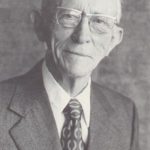Description
“That I May Know Him”
A Personal Testimony
by
VANCE HAVNER
2015
XII. “THE BATTLE IS THE LORD’S”
XIV. “FORGET NOT ALL HIS BENEFITS”
FOREWORD
“Here I raise mine Ebenezer;
Hither by Thy help I’m come.”
This book is not an effort at autobiography. Rather, it is a testimony to that grace which has brought me safe thus far, and will, I am persuaded, lead me home.
It is difficult to write such an account. There is no way to escape the personal pronoun. But it is the writer’s sincere hope that through the meanderings of the story the reader may discern chiefly and be most aware of the Unseen Presence. In this little book I would, like Samuel of old, set up a stone and say, “Hitherto hath the Lord helped us.” And being assured of the Hitherto, we fear not the Henceforth.
- H.
Greensboro, N.C.
I. “TRAIN UP A CHILD…”
In the red hills of North Carolina’s Catawba County, between the little towns of Hickory and Shelby, rises one lookout that commands a glorious view of east and west, so striking that passing travelers often stop to look awhile. On the east, the woods and fields stretch to a level skyline, where at night the lights of five towns twinkle like footlights of a mammoth stage. On the west, the hills rise higher until they become the Blue Ridge Mountains, standing like calm and faithful sentinels along the far horizon.
To a little country boy who played among the oaks that circled his humble home on this high hilltop the eastern towns and twinkling lights seemed to speak of man’s achievement, of progress and civilization, while the western hills seemed always to bear witness to nature and things eternal. The constant change of the one was balanced by the steady permanence of the other.
My home community was called Jugtown. It had every right to the title. My father and grandfathers and uncles were potters, and as a boy I often stood entranced while watching the wonder of clay growing into form and beauty under the deft hands of the “worker on the wheels.” From Jeremiah’s lesson of the vessel marred and remade, preachers have prepared sermons on “A Life Made Over” or “The Divine Potter,” and, with Paul, they have dwelt on God’s sovereignty in making of the same lump one vessel to honour and another to dishonour. When nowadays we sing, “Have Thine own way, Lord, have Thine own way; Thou art the Potter, I am the clay,” my thoughts go back to Jugtown and the fashioner of earthen vessels.
The home of my father, Pinkney (or, as the neighbours called him, “Pink”) Havner was no pretentious affair. There were no rugs, no upholstered chairs, absolutely no modern conveniences. But in it and around it were all those simple and blessed things that made up the life of a country boy in that era just before progress got into high gear and, to use the clever1 phrase of another, before “the family was let out by auto and the world let in by radio.” There was a plain house in healthful hilltop atmosphere; the best drinking water for miles around, good solid food that stuck to the ribs better than drugstore luncheons and modern nick-nacks with goofy names. There were woods to ramble in, with a spring and a brook in the pasture. On the back porch a honeysuckle vine lured the hummingbird, and each summer evening the wood thrush sang his vespers just about “milking time.”
Father was the old-fashioned sort who believed that the authority in the home belonged to the parents and not to the children. He was in favour of the posterior application of superior force when necessary. Although he was called to preach, he never preached, and for the rest of his life he was conscious of having missed God’s best. But he stood head and shoulders above most of the community, and the neighbours sought him often for counsel. Leader in the little country church, Corinth Baptist, he was the pastor’s right-hand man, and his home was the haven of all itinerant preachers. I counted no privilege greater than to be allowed to sit up late when the minister spent the night with us and listen to him and father discourse on the things of God. Father knew the speech of Zion, the language of things heavenly. I marvel today that so many who claim to be Christians can talk on other subjects with liberty but are speechless concerning what ought to be their favourite theme. It was not so with father. Recently a friend of his said to me, “I do not remember ever talking with him over fifteen minutes before he turned the conversation to some spiritual subject.” He could talk it, and, by the grace of God, he lived it. He had not only a talking but a “walking” knowledge of the Scriptures.
Father had a helpmeet in mother, a “keeper at home” who found there enough to do. Sturdy, practical, faithful, mother did not exercise herself in things too wonderful for her. She knew her orbit and stayed in it. In the lowly, simple duties of day-by-day she excelled, and her children call her blessed. Mother had little to say, but when the time came to size up a situation and pass her verdict she could do so very adequately! Father was sometimes inclined to take himself too seriously, and it was well that mother had a philosophy mixed with humour that stood her in good stead through many a troubled hour.
Into such an old-fashioned home this scribe was born on the seventeenth of October, 1901. Being a late arrival, much younger than his brother and sister, he had no playmates. Being extremely frail, he was fed for some years on a diet that would have kept him so had he not got hold of a bowl of cabbage one day when nobody was looking. He devoured that and because he survived, it was decided that probably he could stand any food if cabbage wouldn’t kill him.
So he grew up in that leisurely good era, the last years of the horse-and-buggy age, before the modern hurricane set in. What happy recollections filter back from those hill-billy days of the old parlour lamp and the big family album, cotton-pickings and corn-shuckings, corn-bread and milk at night and molasses in the morning, “singin’s” on Sunday afternoons when the young folk gathered around the organ; the singing school where we learned the do-re-mis in shaped notes; the “big meetin’ ” at Corinth in August after “laying-by” time on the farm; commencement day, always called “the exhibition,” at the little country school; the Old Soldiers’ Reunion Day, the annual pink-lemonade event, at Newton, the county seat; the rocking chair before the old fireplace, cozy retreat on many a snowy day; tramping the summer woods with Shep, faithful companion of boyhood years – no man has fully lived who did not grow up with a dog!
Happy dear old days among old-timey people back in the hills! There were woods aplenty to walk in. Sawmills had not yet devastated the timber, and one could start out in almost any direction and soon lose himself among the oaks and pines. I remember a character we used to call “ ’Possum John.” He lived by hunting and fishing and a little farming. He could see a hiding rabbit where the rest of us saw only a clump of grass. What a simple life he lived, wise in the ways of the woods! He was a sort of “white Indian” and seemed perennially happy. He hunted rabbits by day and ’possums by night, and was a sage in the lore of the woods and fields.
The memory which lingers most clearly and which, doubtless, means most is that of a few good books. I can remember reading Pilgrim’s Progress to mother on winter nights. Christian and Christiana and Great-Heart and Faithful and all that immortal host that Bunyan gave to the world, how we grew tense over their tribulations and thrilled over their triumphs! How we enjoyed seeing the saints get safely over the river and into the Celestial City! In this day of peanut-butter-sandwich theology, what a price we have paid for passing up the moral beefsteak of books that are books indeed! Forget the sawdust and shavings of modern bestsellers and read Pilgrim’s Progress again; then read Alexander Whyte’s Bunyan Characters and add iron to your soul and muscle to your spiritual biceps!
Foxe’s Book of Martyrs also claimed a share of my attention in those days. Somewhere Father had acquired a set of volumes, extracts, from the best of literature. I revelled in Little Women and followed Alice on her trip Through the Looking Glass, becoming so enamoured of Looking-Glass Land that I devoutly wished I could get through the mirror on our best dresser and explore the strange world beyond.
But chiefest of all was the good old Book, to which I was encouraged to give first place. Aided by a book of Bible pictures and stories, I learned early that no characters can be so entrancing as Joseph and Moses and David and Elijah and Peter and Paul. I remember sitting with my cousins, going through the Bible pictures, labelling Cain bad and Abel good, and so through the book, dividing the sheep from the goats. For this generation, brought up on movie thrillers and silly comics, I covet a childhood nurtured on the Word of God. It might seem the depth of boredom to a modern youngster fed up on trash and jaded from worn-out excitements, but life was happier before the Amen age gave way to the era of So What.





Reviews
There are no reviews yet.